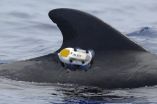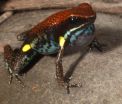Prognostic factors identified for peripheral squamous cell carcinomas of the lung
2014-10-24
(Press-News.org) DENVER – A better survival outcome is associated with low blood levels of squamous cell carcinoma antigen, or absence of tumor invasion either into the space between the lungs and chest wall or into blood vessels of individuals with a peripheral squamous cell carcinoma, a type of non-small cell lung cancer (NSCLC).
Lung cancer is the most common cause of cancer-related death worldwide and lung squamous cell carcinomas (SCC) account for 20-30% of all NSCLC. SCC can be classified as either central (c-SCC) or peripheral (p-SCC) depending on the primary location. While c-SCC is the most prevalent, the incidence of p-SCC is increasing and the clinical and biological behaviors of p-SCC remain unclear.
Researchers from Keio University School of Medicine and Saiseikai Utsunomiya Hospital in Japan evaluated several clinical and pathological variables in 280 patients with surgically removed p-SCC in order to identify potential prognostic factors.
Results published in the Journal of Thoracic Oncology, the official journal of the International Association for the Study of Lung Cancer (IASLC), show that low preoperative levels of squamous cell carcinoma antigen in the serum or either absence of tumor invasion into the pleura (the space between the lungs and chest wall) or tumor vasculature are independent prognostic factors for patients with any stage of p-SCC. These patients had an extended period without disease recurrence and longer overall survival. The same was also seen for the sub-group of patients with early stage I disease.
The authors note that "our study revealed that p-SCCs with pleural or vascular invasion or high serum SCC antigen are more likely to recur than those without it; even in stage I patients. Pleural and/or vascular invasion are thought to be essential steps in the progression and metastasis of p-SCCs and high serum SCC antigen may suggest micro-metastases at the time of surgery." The authors propose that "patients with high serum SCC levels, vascular invasion or pleural invasion should have their tumor stage upgraded in order to reflect the clear differences in survival. Clinical trials should be performed to evaluate if postoperative chemotherapy would benefit these patients who typically may not receive chemotherapy because of their early stage."
INFORMATION:
Lead author Tomonari Kinoshita, MD, senior author Mitsutomo Kohno, MD, PhD and co-authors Takashi Ohtsuka, MD, PhD, Ikuo Kamiyama, MD, and Atsushi Tajima, MD, PhD are members of IASLC.
About the IASLC
The International Association for the Study of Lung Cancer (IASLC) is the only global organization dedicated to the study of lung cancer. Founded in 1974, the association's membership includes more than 4,000 lung cancer specialists in 80 countries. To learn more about IASLC please visit http://www.iaslc.org
ELSE PRESS RELEASES FROM THIS DATE:
2014-10-24
VIDEO:
On Oct. 23, while North America was witnessing a partial eclipse of the sun, the Hinode spacecraft observed a 'ring of fire' or annular eclipse from its location hundreds of...
Click here for more information.
The moon passed between the Earth and the sun on Thursday, Oct. 23. While avid stargazers in North America looked up to watch the spectacle, the best vantage point was several hundred miles above the North Pole.
The Hinode spacecraft was in the right place at the ...
2014-10-24
DURHAM, N.C. -- Many marine animals are world travelers, and scientists who study and track them can rarely predict through which nations' territorial waters their paths will lead.
In a new paper in the journal Marine Policy, Duke University Marine Lab researchers argue that coastal nations along these migratory routes do not have precedent under the law of the sea to require scientists to seek advance permission to remotely track tagged animals in territorial waters.
Requiring scientists to gain advance consent to track these animals' unpredictable movements is impossible, ...
2014-10-24
DURHAM, N.C. – Frogs are well-known for being among the loudest amphibians, but new research indicates that the development of this trait followed another: bright coloration. Scientists have found that the telltale colors of some poisonous frog species established them as an unappetizing option for would-be predators before the frogs evolved their elaborate songs. As a result, these initial warning signals allowed different species to diversify their calls over time.
Zoologists at the National Evolutionary Synthesis Center (NESCent), the University of British Columbia, ...
2014-10-24
NASA scientists have identified an unexpected high-altitude methane ice cloud on Saturn's moon Titan that is similar to exotic clouds found far above Earth's poles.
This lofty cloud, imaged by NASA's Cassini spacecraft, was part of the winter cap of condensation over Titan's north pole. Now, eight years after spotting this mysterious bit of atmospheric fluff, researchers have determined that it contains methane ice, which produces a much denser cloud than the ethane ice previously identified there.
"The idea that methane clouds could form this high on Titan is completely ...
2014-10-24
In a study just published in the International Journal of Cardiology, researchers from the K.G. Jebsen Center for Exercise in Medicine – Cardiac Exercise Research Group (CERG) at the Norwegian University of Science and Technology (NTNU) and the Department of Cardiothoracic Surgery at the St. Olavs Hospital in Trondheim, Norway have shown that shutting off the blood supply to an arm or leg before cardiac surgery protects the heart during the operation.
The research group wanted to see how the muscle of the left chamber of the heart was affected by a technique, called ...
2014-10-24
Endurance athletes taking part in triathlons are at risk of the potentially life-threatening condition of swimming-induced pulmonary oedema. Cardiologists from Musgrove Park Hospital, Taunton, writing in the Journal of the Royal Society of Medicine, say the condition, which causes an excess collection of watery fluid in the lungs, is likely to become more common with the increase in participation in endurance sports. Increasing numbers of cases are being reported in community triathletes and army trainees. Episodes are more likely to occur in highly fit individuals undertaking ...
2014-10-24
Six Case Western Reserve scientists are part of an international team that has discovered two compounds that show promise in decreasing inflammation associated with diseases such as ulcerative colitis, arthritis and multiple sclerosis. The compounds, dubbed OD36 and OD38, specifically appear to curtail inflammation-triggering signals from RIPK2 (serine/threonine/tyrosine kinase 2). RIPK2 is an enzyme that activates high-energy molecules to prompt the immune system to respond with inflammation. The findings of this research appear in the Journal of Biological Chemistry.
"This ...
2014-10-24
Newly published findings from the University of Waterloo are giving women with bad backs renewed hope for better sex lives. The findings—part of the first-ever study to document how the spine moves during sex—outline which sex positions are best for women suffering from different types of low-back pain. The new recommendations follow on the heels of comparable guidelines for men released last month.
Published in European Spine Journal, the female findings debunk the popular belief that spooning—where couples lie on their sides curled in the same direction—is ...
2014-10-24
Down syndrome is the most common chromosomal abnormality in humans, involving a third copy of all or part of chromosome 21. In addition to intellectual disability, individuals with Down syndrome have a high risk of congenital heart defects. However, not all people with Down syndrome have them – about half have structurally normal hearts.
Geneticists have been learning about the causes of congenital heart defects by studying people with Down syndrome. The high risk for congenital heart defects in this group provides a tool to identify changes in genes, both on and ...
2014-10-24
In early drug discovery, you need a starting point, says Northeastern University associate professor of chemistry and chemical biology Michael Pollastri.
In a new research paper published Thursday in the journal PLOS Neglected Tropical Diseases, Pollastri and his colleagues present hundreds of such starting points for potentially treating African sleeping sickness, a deadly disease that claims thousands of lives annually.
Pollastri, who runs Northeastern's Laboratory for Neglected Disease Drug Discovery, ...
LAST 30 PRESS RELEASES:
[Press-News.org] Prognostic factors identified for peripheral squamous cell carcinomas of the lung





